【英语】山西省右玉一中2015-2016学年高二5月月考试题
20152015---2016学年度高二第一学期英语月考试题答案2.doc
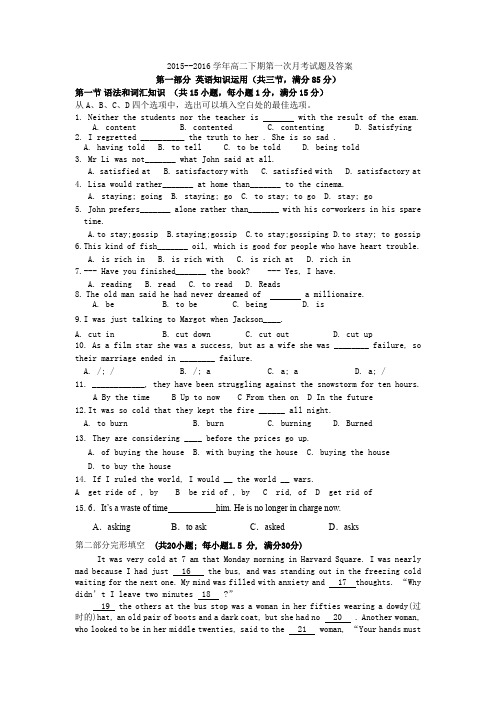
2015--2016学年高二下期第一次月考试题及答案第一部分英语知识运用(共三节,满分85分)第一节语法和词汇知识(共15小题,每小题1分,满分15分)从A、B、C、D四个选项中,选出可以填入空白处的最佳选项。
1. Neither the students nor the teacher is with the result of the exam.A. contentB. contentedC. contentingD. Satisfying2. I regretted __________ the truth to her . She is so sad .A. having toldB. to tellC. to be toldD. being told3. Mr Li was not_______ what John said at all.A. satisfied atB. satisfactory withC. satisfied withD. satisfactory at4. Lisa would rather_______ at home than_______ to the cinema.A. staying; goingB. staying; goC. to stay; to goD. stay; go5. John prefers_______ alone rather than_______ with his co-workers in his spare time.A.to stay;gossipB.staying;gossipC.to stay;gossipingD.to stay; to gossip6.This kind of fish_______ oil, which is good for people who have heart trouble.A. is rich inB. is rich withC. is rich atD. rich in7.--- Have you finished_______ the book? --- Yes, I have.A. readingB. readC. to readD. Reads8.The old man said he had never dreamed of a millionaire.A. beB. to beC. beingD. is9.I was just talking to Margot when Jackson____.A. cut inB. cut downC. cut outD. cut up10. As a film star she was a success, but as a wife she was ________ failure, so their marriage ended in ________ failure.A. /; /B. /; aC. a; aD. a; /11. ____________, they have been struggling against the snowstorm for ten hours.A By the timeB Up to nowC From then onD In the future12.It was so cold that they kept the fire ______ all night.A. to burnB. burnC. burningD. Burned13. They are considering ____ before the prices go up.A. of buying the houseB. with buying the houseC. buying the houseD. to buy the house14. If I ruled the world, I would __ the world __ wars.A get ride of , byB be rid of , byC rid, ofD get rid of15.6.It’s a waste of timehim. He is no longer in charge now.A.asking B.to ask C.asked D.asks第二部分完形填空 (共20小题; 每小题1.5 分, 满分30分)It was very cold at 7 am that Monday morning in Harvard Square. I was nearly mad because I had just 16 the bus, and was standing out in the freezing cold waiting for the next one. My mind was filled with anxiety and 17 thoughts. “Why didn’t I leave two minutes 18 ?”19 the others at the bus stop was a woman in her fifties wearing a dowdy(过时的)hat, an old pair of boots and a dark coat, but she had no 20 . Another woman, who looked to be in her middle twenties, said to the 21 woman, “Your hands must be very cold.You’ll get frostbitten(冻伤的)in this weather.” She 22 her heavy backpack to the ground, bent down, and began 23 for something inside her backpack. The older woman looked 24 and said, ”Oh no, that’s OK. I’m 25 .The younger woman continued to search 26 in her backpack and the older woman kept repeating, “Don’t 27 yourself. I’ll be all right.” After 28 seemed like so many minutes, the younger woman 29 a pair of purple gloves. She took the older woman’s hands and gently 30 a glove on each hand, covering one finger 31 . The older woman said, “Thank you. You’re so sweet.”Though I was very cold, the act of 32 gave ma a warm feeling inside. It also motivated(激发)me to buy five pairs of purple gloves, similar to hers, and 33 them in my bag, just in case I 34 someone who was in great 35 on a cold day.16. A. missed B. got C. waited D. seen17. A. negative B. happy C. good D. creative18. A. ago B. early C. late D. soon19. A. With B. Between C. Among D. Before20. A. shoes B. coat C. scarf D. gloves21. A. older B. younger C. latter D. shorter22. A. pushed B. pulled C. lifted D. dropped23. A. watching B. caring C. looking D. leaving24. A. down B. up C. away D. out25. A. sorry B. fine C. happy D. glad26. A. for B. of C. with D. around27. A. upset B. trouble C. save D. satisfy28. A. it B. that C. what D. she29. A. pulled out B. picked up C. picked out D. put on30. A. gave B. took C. situated D. placed31. A. at once B. at times C. at a time D. at one time32. A. happiness B. kindness C. rudeness D. sadness33. A. lie B. take C. hang D. put34. A. took care B. ran into C. learned of D. turned to35. A. need B. honor C. shock D. surprise第二部分阅读理解(共两节,满分40分)第一节(共15小题;每小题2分,满分30分)阅读下面短文,从短文后各题的A、B、C、D四个选项中,选取出适合填入空白处的最佳选项。
【KS5U原创】新课标2015-2016学年高二上学期第一次月考 英语 Word版含答案
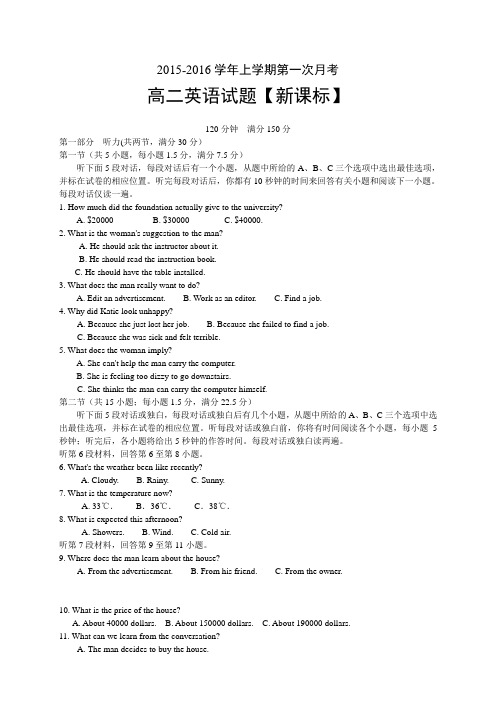
2015-2016学年上学期第一次月考高二英语试题【新课标】120分钟满分150分第一部分听力(共两节,满分30分)第一节(共5小题,每小题1.5分,满分7.5分)听下面5段对话,每段对话后有一个小题,从题中所给的A、B、C三个选项中选出最佳选项,并标在试卷的相应位置。
听完每段对话后,你都有10秒钟的时间来回答有关小题和阅读下一小题。
每段对话仅读一遍。
1. How much did the foundation actually give to the university?A. $20000B. $30000C. $40000.2. What is the woman's suggestion to the man?A. He should ask the instructor about it.B. He should read the instruction book.C. He should have the table installed.3. What does the man really want to do?A. Edit an advertisement.B. Work as an editor.C. Find a job.4. Why did Katie look unhappy?A. Because she just lost her job.B. Because she failed to find a job.C. Because she was sick and felt terrible.5. What does the woman imply?A. She can't help the man carry the computer.B. She is feeling too dizzy to go downstairs.C. She thinks the man can carry the computer himself.第二节(共15小题;每小题1.5分,满分22.5分)听下面5段对话或独白,每段对话或独白后有几个小题,从题中所给的A、B、C三个选项中选出最佳选项,并标在试卷的相应位置。
15—16学年下学期高二第一次月考英语试题(附答案)(7)
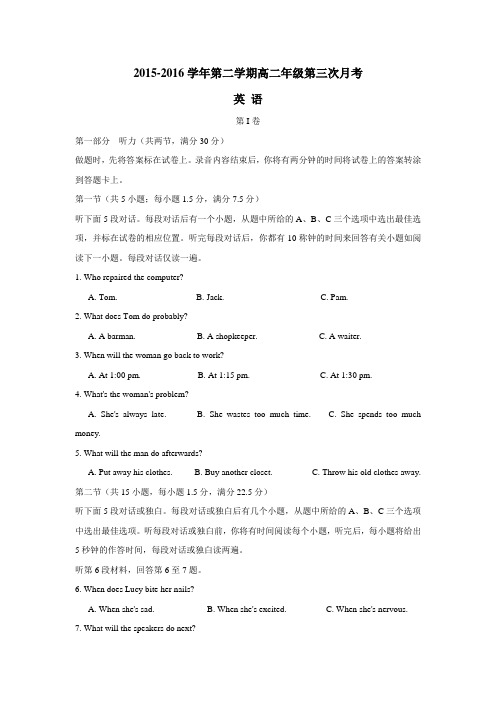
2015-2016学年第二学期高二年级第三次月考英语第I卷第一部分听力(共两节,满分30分)做题时,先将答案标在试卷上。
录音内容结束后,你将有两分钟的时间将试卷上的答案转涂到答题卡上。
第一节(共5小题;每小题1.5分,满分7.5分)听下面5段对话。
每段对话后有一个小题,从题中所给的A、B、C三个选项中选出最佳选项,并标在试卷的相应位置。
听完每段对话后,你都有10称钟的时间来回答有关小题如阅读下一小题。
每段对话仅读一遍。
1. Who repaired the computer?A. Tom.B. Jack.C. Pam.2. What does Tom do probably?A. A barman.B. A shopkeeper.C. A waiter.3. When will the woman go back to work?A. At 1:00 pm.B. At 1:15 pm.C. At 1:30 pm.4. What's the woman's problem?A. She's always late.B. She wastes too much time.C. She spends too much money.5. What will the man do afterwards?A. Put away his clothes.B. Buy another closet.C. Throw his old clothes away. 第二节(共15小题,每小题1.5分,满分22.5分)听下面5段对话或独白。
每段对话或独白后有几个小题,从题中所给的A、B、C三个选项中选出最佳选项。
听每段对话或独白前,你将有时间阅读每个小题,听完后,每小题将给出5秒钟的作答时间,每段对话或独白读两遍。
听第6段材料,回答第6至7题。
6. When does Lucy bite her nails?A. When she's sad.B. When she's excited.C. When she's nervous.7. What will the speakers do next?A. Watch a video.B. Play games.C. Visit a website.听第7段材料,回答第8至9题。
高中英语真题-2015-2016学年高二英语下学期第一次月考试题
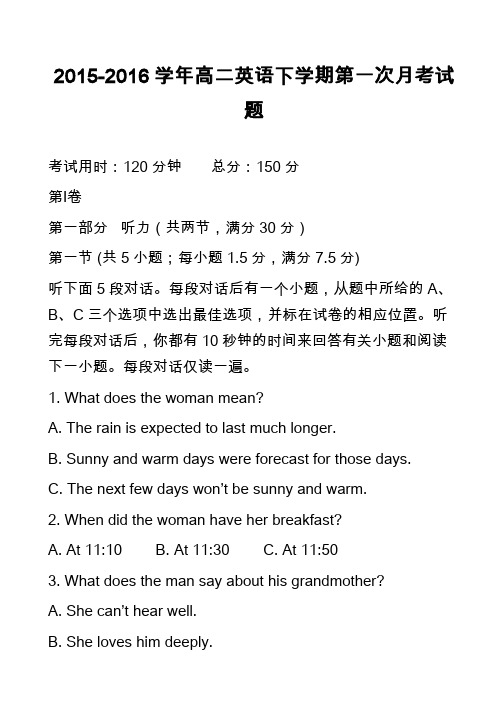
2015-2016学年高二英语下学期第一次月考试题考试用时:120分钟总分:150分第Ⅰ卷第一部分听力(共两节,满分30分)第一节 (共5小题;每小题1.5分,满分7.5分)听下面5段对话。
每段对话后有一个小题,从题中所给的A、B、C三个选项中选出最佳选项,并标在试卷的相应位置。
听完每段对话后,你都有10秒钟的时间来回答有关小题和阅读下一小题。
每段对话仅读一遍。
1. What does the woman mean?A. The rain is expected to last much longer.B. Sunny and warm days were forecast for those days.C. The next few days won’t be sunny and warm.2. When did the woman have her breakfast?A. At 11:10B. At 11:30C. At 11:503. What does the man say about his grandmother?A. She can’t hear well.B. She loves him deeply.C. She has forgotten her children.4. What do we know about the man?A. He wants both pieces of cloth.B. He doesn’t like either piece of cloth.C. He can’t tell the two pieces of cloth apart.5. Which of the following can best describe Tony?A. DangerousB. Brave.C. Rude第二节(共15小题:每小题1.5分,共22.5分)听下面5段对话或独白。
山西省右玉一中2015—2016学年高二英语上册期末试题
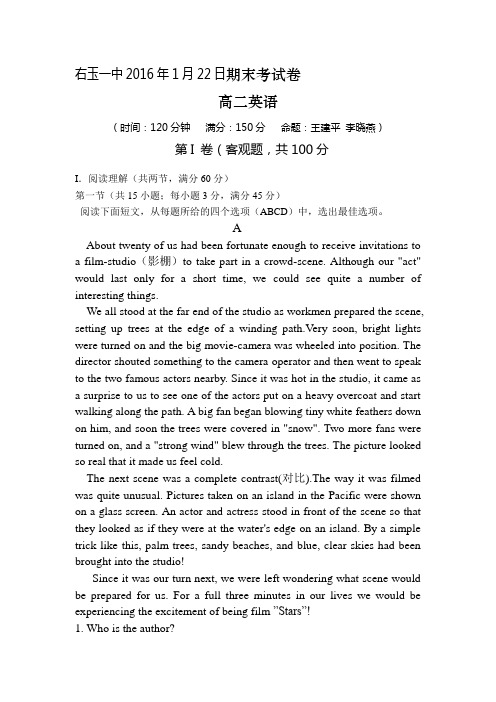
右玉一中2016年1月22日期末考试卷高二英语(时间:120分钟满分:150分命题:王建平李晓燕)第I 卷(客观题,共100分I.阅读理解(共两节,满分60分)第一节(共15小题;每小题3分,满分45分)阅读下面短文,从每题所给的四个选项(ABCD)中,选出最佳选项。
AAbout twenty of us had been fortunate enough to receive invitations to a film-studio(影棚)to take part in a crowd-scene. Although our "act" would last only for a short time, we could see quite a number of interesting things.We all stood at the far end of the studio as workmen prepared the scene, setting up trees at the edge of a winding path.Very soon, bright lights were turned on and the big movie-camera was wheeled into position. The director shouted something to the camera operator and then went to speak to the two famous actors nearby. Since it was hot in the studio, it came as a surprise to us to see one of the actors put on a heavy overcoat and start walking along the path. A big fan began blowing tiny white feathers down on him, and soon the trees were covered in "snow". Two more fans were turned on, and a "strong wind" blew through the trees. The picture looked so real that it made us feel cold.The next scene was a complete contrast(对比).The way it was filmed was quite unusual. Pictures taken on an island in the Pacific were shown on a glass screen. An actor and actress stood in front of the scene so that they looked as if they were at the water's edge on an island. By a simple trick like this, palm trees, sandy beaches, and blue, clear skies had been brought into the studio!Since it was our turn next, we were left wondering what scene would be prepared for us. For a full three minutes in our lives we would be experiencing the excitement of being film ”Stars”!1. Who is the author?A. A cameraman.B. A film director.C. A crowd-scene actorD. A workman for scene setting2. What made the author feel cold?A. The heavy snowfall.B. The man-made scene.C. The low temperature.D. The film being shown.3. What would happen in the "three minutes" mentioned, in the last paragraph?A. A new scene would be filmed.B. More stars would act in the film.C. The author would leave the studio.D. The next scene would be prepared.BAt Harton College---an English boarding school for boys, there are many rules. Fifteen-year-old Bob Sanders often breaks them.The boys can go into the town in the afternoon after class. But they must return to the school at six o’clock. One afternoon Bob walked to the town. He looked at the shops and then went to the cinema. After the film, he looked at his watch. It was after eight o’clock. He was a little worried. He walked back to Harton College as fast as possible.When he arrived, he ran quickly to the main entrance. It was locked. He went round the school building to another door. That one was locked too. He looked up at the window of his dormitory. It was on the third floor. The window was open. But it was quite dark and he could not climb up the wall easily. Then he saw another open window on the ground floor. It was the window of the headmaster’s study.He looked into the room---no one was there. Bob quickly climbed on to the window and jumped into the room. Just then he heard a noise. Then someone turned on a light in the corridor(走廊). Bob looked around and then hid under the sofa. One minute later, Mr Mannering, the headmaster, came in. He turned on the light on his desk, and sat down on the sofa. Then he opened a book and began to read.Bob lay under the sofa as quietly as possible. He couldn’t move. The floor was cold and uncomfortable. He looked at the headmaster’s shoes and socks for an hour.“Why doesn’t he get up and go to bed?” Bob thought.Mr Mannering read his book for another hour. Finally, the headmaster closed his book and stood up. He put the book on a shelf and walked towards the door.“Thank God he didn’t find me under the sofa.” thought Bob.Then Mr Mannering stopped and spoke towards the sofa.“Would you turn off the light when you leave?” He said and left the study.4. Bob returned to the school more than two hours late because__________.A. he enjoyed himself too muchB. he did not catch the busC. he hated the rulesD. he ran into an old friend5. Bob didn’t go to his dormitory because____________.A. the door was lockedB. the window was shutC. it was quite darkD. the wall was too high for him to climb up6. It’s obvious that_________.A. the headmaster didn’t notice BobB. the headmaster found Bob under the sofaC. the headmaster thought a thief had broken into his studyD. there was a third man in the study7. From this passage we know that the headmaster is________.A. kindB. strictC. wiseD. humorousCHoney from the African forest is not only a kind of natural sugar, it is also delicious.Most people, and many animals, like eating it. However, the only way for them to get that honey is to find a wild bees' nest and take the honey from it. Often, these nests are high up in trees, and it is difficult to find them. In parts of Africa, though, people and animals looking for honey have a strange and unexpected helper - a little bird called a honey guide.The honey guide does not actually like honey, but it does like the wax in the beehives (蜂房). The little bird cannot reach this wax, which is deep inside the bees' nest. So, when it finds a suitable nest, it looks forsomeone to help it. The honey guide gives a loud cry that attracts the attention of both passing animals and people. Once it has their attention, it flies through the forest, waiting from time to time for the curious animal or person as it leads them to the nest. When they finally arrive at the nest, the follower reaches in to get at the delicious honey as the bird patiently waits and watches. Some of the honey, and the wax, always falls to the ground, and this is when the honey guide takes its share. Scientists do not know why the honey guide likes eating the wax, but it is very determined in its efforts to get it. The birds seem to be able to smell wax from a long distance away. They will quickly arrive whenever a beekeeper is taking honey from his beehives, and will even enter churches when beeswax candles are being lit.8. Why is it difficult to find a wild bees' nest?A. It's small in size.B. It's hidden in trees.C. It's covered with wax.D. It's hard to recognize.9. What do the words "the follower" in Paragraph 2 refer to?A. A bee.B. A bird.C. A honey seeker.D. A beekeeper.10. The honey guide is special in the way .A. it gets its foodB. it goes to churchC. it sings in the forestD. it reaches into bees' nests11. What can be the best title for the text?A. Wild BeesB. Wax and HoneyC. Beekeeping in AfricaD. Honey-Lover's HelperDIS IT TIME TO GET MP3?Your computer has been playing music for years, one CD at a time. Now hundreds of songs can be stored in your PC(personal computer)if they’re in the MP3 format.What is it?MP3 compresses music into small computer friendly files. You access MP3 music several ways: Music can be downloaded from websites that have converted vast music libraries into MP3. Or you can prerecord CDs into your PC and convert songs in minutes into MP3. Once MP3 music is on your PC’s hard drive, you can play it through your computer’sspeakers, “burn” it onto blank CDs or exchange MP3 files with friends using E-mail.How much?Software needed to play and convert MP3 music is often free. It comes preinstalled on most new computers or can be downloaded from many websites, including . Some MP3 sites are free. Just type “MP3 sites ” into any search engine. The popular MP3 players start at around $50 and can hold hundreds of songs.A blank CD on which you can record music costs about a dollar.AdvantagesMp3 turns your home PC into a tape recorder. Tiny MP3 players are the size of a card, making it easy to take hundreds of songs with you. DisadvantagesYou may find that music at many sites is limited. And some only allow you to listen rather than download offerings. Others let you download music that can’t be copied to MP3 players. And a growing number of new CDs make it impossible to copy songs to a computer.12. How can you get MP3 music?A. By turning your home PC into a tape recorder.B. By taking your own music or songs with you.C. By copying songs to a PC through the speakers.D. By downloading from websites which have converted music libraries into MP3.13. Which is NOT true according to the passage?A. Software needed to play and convert MP3 music is often free of charge.B. MP3 music can be with friends by e-mail.C. MP3 music can be downloaded for free at any site.D. A greater number of new CDs make it possible to copy songs to a computer.14. The underlined word “burn” probably means _________.A. fireB. copyC. downloadD. play15. How much will you pay for a MP3 player?A. Free of charge.B. Free downloading.C. At least fifty dollarsD. About a dollar.第二节(共5小题;每小题3分,满分15分)根据短文内容,从短文后的选项中选出能填入空白处的最佳选项。
【英语】山西省右玉一中2015-2016学年高二下学期期中考试试题
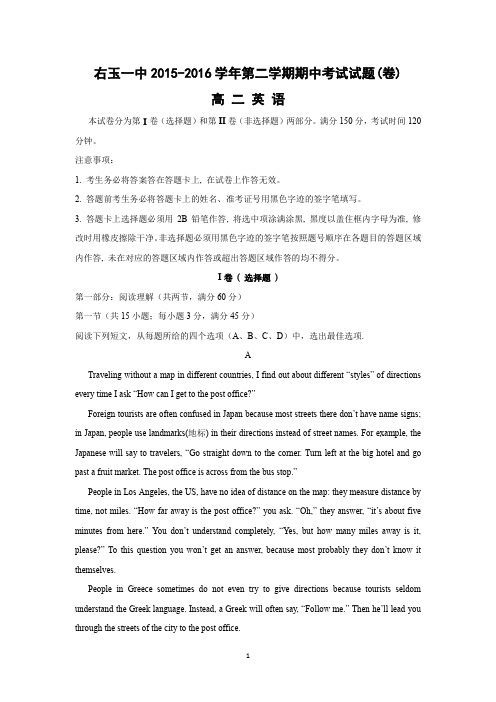
右玉一中2015-2016学年第二学期期中考试试题(卷)高二英语本试卷分为第I卷(选择题)和第II卷(非选择题)两部分。
满分150分,考试时间120分钟。
注意事项:1. 考生务必将答案答在答题卡上, 在试卷上作答无效。
2. 答题前考生务必将答题卡上的姓名、准考证号用黑色字迹的签字笔填写。
3. 答题卡上选择题必须用2B铅笔作答, 将选中项涂满涂黑, 黑度以盖住框内字母为准, 修改时用橡皮擦除干净。
非选择题必须用黑色字迹的签字笔按照题号顺序在各题目的答题区域内作答, 未在对应的答题区域内作答或超出答题区域作答的均不得分。
I卷( 选择题)第一部分:阅读理解(共两节,满分60分)第一节(共15小题;每小题3分,满分45分)阅读下列短文,从每题所给的四个选项(A、B、C、D)中,选出最佳选项.ATraveling without a map in different countries, I find out about different “styles” of directions every time I ask “How can I get to the post office?”Foreign tourists are often confused in Japan because most streets there don’t have name signs; in Japan, people use landmarks(地标) in their directions instead of street names. For example, the Japanese will say to travelers, “Go straight dow n to the corner. Turn left at the big hotel and go past a fruit market. The post office is across from the bus stop.”People in Los Angeles, the US, have no idea of distance on the map: they measure distance by time, not miles. “How far away is the post office?” you ask. “Oh,” they answer, “it’s about five minutes from here.” You don’t understand completely, “Yes, but how many miles away is it, please?” To this question you won’t get an answer, because most probably they don’t know it themselves.People in Greece sometimes do not even try to give directions because tourists seldom understand the Greek language. Instead, a Greek will often say, “Follow me.” Then he’ll lead you through the streets of the city to the post office.Sometimes a person doesn’t know the answer to your question. What happens in the situation?A New Yorker might say, “Sorry, I have no idea.” But in Yucatan, Mexico, no one answers “I don’t know.” People there believe that “I don’t” is impolite. They usually give an answer, but often a wrong one. So a tourist can get lost very easily in Yucatan!However, one thing will help you everywhere in the world. It’s body language.21. Which one of the following is probably an example of Japanese directions?A. “Go south two miles. Turn west and then go another mile.”B. “Turn right at the hospital and go past a school. The library is right in front of you.”C. “The post office is about five minutes from here.”D. “The post office is at Street Kamira.”22. People in Los Angeles don’t give directions in miles because ______.A. they use landmarks in their directions instead of distanceB. they often have no idea of distance measured by milesC. they prefer to lead you the wayD. they prefer to use body language23. Greeks give directions by ______.A. using street namesB. using landmarksC. leading people the wayD. giving people a wrong direction24. Where is Yucatan?A. In the USA.B. In Japan.C. In Mexico.D. In Greece.BAsk just about any college student you know, and he is likely to tell you that he is a member of . Many students say they check their e-mail. It’s so popular “facelooking” has become a verb “Everywhere everyone is doing it,” college student Katie Silverman said, “It’s like everyone’s center of life.”Facebook is an online social meeting place where students create profiles (简介),share personal information, and meet other members. It is password protected and targeted to high school and college students; members must have an edu.email address to join.Many students say it has changed their social lives, giving them an easy way to find and chat with classmates who share their interests. “Some people might be too shy to go to talk to someone they like in one of their class es, but on facebook it’s a lot easier to strike up(搭讪)aconversation,” said Rahul Vanjani.The website was founded by two Harward University students who wanted to meet more of their classmates. It became so popular that the website is at 2,200 colleges and at 22,000 high schools. It says that it has 6 million active users, two—thirds of whom are on it every day. Many of the facebook members said their parents had no idea they were on it .“No way. My parents certainly don’t know about it,” said a college s enior who asked us not to use his name.To keep it popular, Facebook says it stops students posting improper information. Some students have paid the price. At Fisher College in Boston, two students were kicked out for using to do something that is against the law. At North Carolina State University, four students were punished for posting photos about drinking.25. The passage is mainly about____.A. student’s idea about FacebookB. the development of FacebookC. the popularity of Facebook with studentsD. the rules of Facebook26. To become a member of Facebook,you must_____.A. have an edu,e—mail addressB. have your own profileC. be a high school studentD. offer main personal information27. By saying “Some students have paid the price”in the last paragraph,the author means morestudents_____.A. will have to pay money for being on FacebookB. always use Facebook to do something against the lawC. have been punished for doing some improper things on FacebookD. often stop others from posting improper information on Facebook28. We can learn about Facebook from the passage that______.A. the information that students offer to Facebook is secret to othersB. Facebook is at more colleges that at high schoolsC. 6 million active users of Facebook are on it every dayD. many students don’t want their parents to know they are facebookingCTODAY, Friday, November 12JAZZ with the Mike Thomas Jazz Band at The Derby Arms. Upper Richmond Road West,Sheen.DISCO Satin Sounds Disco. Free at The Lord Napier, Mort lake High St., from 8a. m. to 8p. m. Tel: 682—1158.SATURDAY, November 13JAZZ Lysis at The Bull’s Head, Barnes. Admission 60p.MUSICAL HALL at The Star and Garter, Lower Richmond Road, Putney, provided by the Aba Daba Music Hall company. Good food and entertainment fair price. Tel: 789—6749.FAMIL Y night out? Join the sing-along at The Black Horse. Sheen Road, Richmond.JAZZ The John Bennett Big Band at The Bull’s Head, Barnes. Admission 80p.THE DERBY ARMS, Upper Richmond Road West, give you Joe on the electric accordion(手风琴). Tel: 789—4536SUNDAY, November 14DISCO Satin Sounds Disco, free at The Lord Napier, Mort Lake High Street, from 8 a. m. to 8 p. m.FOLK MUSIC at The Derby Arms. The Short Stuff and residents the Norman Chop Trio. Non-remembers 70p. Tel: 688—4626.HEA VY MUSIC with Tony Simon at The Bull, Upper Richmond Road West, East Sheen.THE DERBY ARMS, Upper Richmond Road West, give you Joe on the electric accordion.29. Where and when can you hear the Norman Chop Trio?A. At the Bull’s Head on Sunday.B. At the Derby Arms on Sunday.C. At the Bull on Saturday.D. At the Black Horse on Saturday.30. Where and when can you hear the Mike Thomas Jazz Band?A. At the Derby Arms on Friday.B. At the Black Horse on Friday.C. At the Star and Garter on Saturday.D. At the Derby Arms on Sunday.31. You want to enjoy the electric accordion on Saturday. Which telephone number do you have toring to find out what time it starts?A. 789—6749.B. 789—4536.C. 682—1158D. 688—4626.DHere is a true story about a famous man who worked in the White House and a criminal(罪犯). They once faced the same thing: their mother gave them apples when they were young.The criminal said: one day, my mother brought some apples and asked my brother and me: “Which do you want?” “The reddest and biggest one,” my little brother said. My mother stared at him and said to him angrily: “You should learn to give the good things to others; you shouldn’t always think of yourself,” Seeing this, I suddenly changed my idea and then said to my mother; “Mum, please give me the smaller one and give the bigger one to my little brother.” Hearing my words, my mother was very happy. She kissed me on my face and gave the reddest and biggest apple to me as a prize. From them on, I learned to tell lies, fight, steal and rob. In order to get what I wanted, I played hard. As a result, I was sent into prison.The famous man from the white house said; One day, my mother brought some apples. She said to my brother and me: “You all want the reddest and biggest one, right? Well, let’s have a competition. Now I divided the grassland in front of the gate into two and I will give one to each of you and you must shear(修剪) it well. And I will give the reddest and biggest apple to him who does it the most quickly and best.”After the competition, I won and I got the biggest apple. In our family, as long as you want to get the best things, you must take part in competition. I think it is fair. No matter what you want, you must pay lots of efforts.32. The criminal got the reddest and biggest apple because______.A. he told the truth that he wanted a smaller oneB. he knew how to make his mother happy from her answer.C. elder brother should of course have the bigger one.D. his mother loved him more than she loved the younger brother.33. We can conclude from the passage that _______.A. it’s wrong to ask children to choose apples when they are not old enough.B. it’s important to make children aware that no matter what they want, they must pay work.C. it’s wrong to ask children not to always think of themselves.D. it’s always necessary to have a competition when we give children apple.34. The writer tells the story by _______.A. organizing it in the order of time.B. making a comparison between two menC. providing some scientific informationD. describing it in the order of space35. It is implied in the passage that _______.A. we should always try to win competitions which can bring us a lot.B. in order to get what we want, we should play hard.C. a mother’s educational method has a great influence on a child’s growing.D. giving children apples will lead them to become criminals.第二节(共5小题;每小题3分,满分15分)根据短文内容,从短文后的选项中选出能填入空白处的最佳选项,选项中有两项为多余选项。
山西省省级重点学校联盟2015-2016学年高二第一次月考试题英语试题 Word版含答案
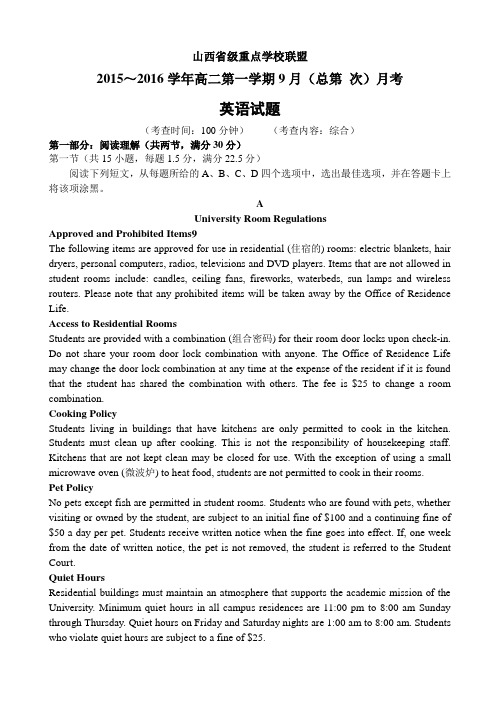
山西省级重点学校联盟2015~2016学年高二第一学期9月(总第次)月考英语试题(考查时间:100分钟)(考查内容:综合)第一部分:阅读理解(共两节,满分30分)第一节(共15小题,每题1.5分,满分22.5分)阅读下列短文,从每题所给的A、B、C、D四个选项中,选出最佳选项,并在答题卡上将该项涂黑。
AUniversity Room RegulationsApproved and Prohibited Items9The following items are approved for use in residential (住宿的) rooms: electric blankets, hair dryers, personal computers, radios, televisions and DVD players. Items that are not allowed in student rooms include: candles, ceiling fans, fireworks, waterbeds, sun lamps and wireless routers. Please note that any prohibited items will be taken away by the Office of Residence Life.Access to Residential RoomsStudents are provided with a combination (组合密码) for their room door locks upon check-in. Do not share your room door lock combination with anyone. The Office of Residence Life may change the door lock combination at any time at the expense of the resident if it is found that the student has shared the combination with others. The fee is $25 to change a room combination.Cooking PolicyStudents living in buildings that have kitchens are only permitted to cook in the kitchen. Students must clean up after cooking. This is not the responsibility of housekeeping staff. Kitchens that are not kept clean may be closed for use. With the exception of using a small microwave oven (微波炉) to heat food, students are not permitted to cook in their rooms.Pet PolicyNo pets except fish are permitted in student rooms. Students who are found with pets, whether visiting or owned by the student, are subject to an initial fine of $100 and a continuing fine of $50 a day per pet. Students receive written notice when the fine goes into effect. If, one week from the date of written notice, the pet is not removed, the student is referred to the Student Court.Quiet HoursResidential buildings must maintain an atmosphere that supports the academic mission of the University. Minimum quiet hours in all campus residences are 11:00 pm to 8:00 am Sunday through Thursday. Quiet hours on Friday and Saturday nights are 1:00 am to 8:00 am. Students who violate quiet hours are subject to a fine of $25.1. Which of the following items are allowed in student rooms?A. Ceiling fans and waterbeds.B. Wireless routers and radios.C. Hair dryers and candles.D. TVs and electric blankets.2. What if a student is found to have told his combination to others?A. The combination should be changed.B. The Office should be charged.C. He should replace the door lock.D. He should check out of the room.3.If a student has kept a cat in his room for a week since the warning, he will face _____.A. parent visitsB. a fine of $100C. the Student CourtD. a written notice4. When can students enjoy a party in residences?A. 7:00 am, Sunday.B. 7:30 am, Thursday.C. 11:30 pm, Monday.D. 00:30 am, Saturday.BOnce when I was facing a decision that involved high risk, I went to a friend. He looked at me for a moment, and then wrote a sentence containing the best advice I’ve ever had: Be bold and brave — and mighty (强大的) forces will come to your aid.Those words made me see clearly that when I had fallen short in the past, it was seldom because I had tried and failed. It was usually because I had let fear of failure stop me from trying at all. On the other hand, whenever I had plunged into deep water, forced by courage or circumstance, I had always been able to swim until I got my feet on the ground again.Boldness means a decision to bite off more than you are sure you can eat. And there is nothing mysterious about the mighty forces. They are potential powers we possess: energy, skill, sound judgment, creative ideas — even physical strength greater than most of us realize.Admittedly, those mighty forces are spiritual ones. But they are more important than physical ones. A college classmate of mine, Tim, was an excellent football player, even though he weighed much less than the average player. “In one game I suddenly found myself confronting a huge player, who had nothing but me between him and our goal line,” said Tim. “I was so frightened that I closed my eyes and desperately threw myself at that guy like a bullet (子弹) —and stopped him cold.”Boldness —a willingness to extend yourself to the extreme—is not one that can be acquired overnight. But it can be taught to children and developed in adults. Confidence builds up. Surely, there will be setbacks (挫折) and disappointments in life; boldness in itself is no guarantee of success. But the person who tries to do something and fails is a lot better off than the person who tries to do nothing and succeeds.So, always try to live a little bit beyond your abilities — and you’ll find your abilities are greater than you ever dreamed.5. Why was the author sometimes unable to reach his goal in the past?A. He faced huge risks.B. He lacked mighty forces.C. Fear prevented him from trying.D. Failure blocked his way to success.6. What is the implied meaning of the underlined part?A. Swallow more than you can digest.B. Act slightly above your abilities.C. Develop more mysterious powers.D. Learn to make creative decisions.7. What was especially important for Tim’s s uccessful defense in the football game?A. His physical strength.B. His basic skill.C. His real fear.D. His spiritual force.8. What is the author’s purpose in writing this passage?A. To encourage people to be courageous.B. To advise people to build up physical power.C. To tell people the ways to guarantee success.D. To recommend people to develop more abilities.CAs Internet users become more dependent on the Internet to store information, are people remember less? If you know your computer will save information, why store it in your own personal memory, your brain? Experts are wondering if the Internet is changing what we remember and how.In a recent study, Professor Betsy Sparrow conducted some experiments. She and her research team wanted to know the Internet is changing memory. In the first experiment, they gave people 40 unimportant facts to type into a computer. The first group of people understood that the computer would save the information. The second group understood that the computer would not save it. Later, the second group remembered the information better. People in the first group knew they could find the information again, so they did not try to remember it.In another experiment, the researchers gave people facts to remember, and told them where to find the information on the Internet. The information was in a specific computer folder (文件夹). Surprisingly, people later remember the folder location (位置) better than the facts. When people use the Internet, they do not remember the information. Rather, they remember how to find it. This is called “transactive memory (交互记忆).”According to Sparrow, we are not becoming people with poor memories as a result of the Internet. Instead, computer users are developing stronger transactive memories; that is, people are learning how to organize huge quantities of information so that they are able to access it at a later date. This doesn’t mean we are becoming either more or less intelligent, but there is no doubt that the way we use memory is changing.9. The passage begins with two questions to ______.A. introduce the main topicB. show t he author’s altitudeC. describe how to use the InternetD. explain how to store information10. In transactive memory, people ______.A. keep the information in mindB. change the quantity of informationC. organize information like a computerD. remember how to find the information11. What is the effect of the Internet accord ing to Sparrow’s research?A. We are using memory differently.B. We are becoming more intelligent.C. We have poorer memories than before.D. We need a better way to access information.DPapa, as a son of a dirt-poor farmer, left school early and went to work in a factory, for education was for the rich then. So, the world became his school. With great interest, he read everything he could lay his hands on, listened to the town elders and learned about the world beyond his tiny hometown. “There’s so much to learn,”he’d say. “Though we’re born stupid, only the stupid re main that way.” He was determined that none of his children would be denied (拒绝) an education.Thus, Papa insisted that we learn at least one new thing each day. Though, as children, we thought this was crazy, it would never have occurred to us to deny Papa a request. And dinner time seemed perfect for sharing what we had learned. We would talk about the news of the day; no matter how insignificant, it was never taken lightly. Papa would listen carefully and was ready with some comment, always to the point.Then came the moment —the time to share the day’s new learning.Papa, at the head of the table, would push back his chair and pour a glass of red wine, ready to listen.“Felice,” he’d say, “tell me what you learned today.”“I learned that the population of Nepal is ...”Silence.Papa was thinking about what was said, as if the salvation (拯救) of the world would depend upon it. “The population of Nepal. Hmm. Well . . . ”he’d say. “Get the map; let’s see where Nepal is.” And the whole family went on a search for Nepal.This same experience was repeated until each family member had a turn. Dinner ended only after we had a clear understanding of at least half a dozen such facts.As children, we thought very little about these educational wonders. Our family, however, was growing together, sharing experiences and partici pating in one another’s education. And by looking at us, listening to us, respecting our input, affirming (肯定) our value, giving us a sense of dignity, Papa was unquestionably our most influential teacher.Later during my training as a future teacher, I studied with some of the most famous educators. They were imparting (传授) what Papa had known all along — the value of continual learning. His technique has served me well all my life. Not a single day has been wasted, though I can never tell when knowing the population of Nepal might prove useful.12. The underlined word “it” in the second paragraph refers to “________”A. one new thingB. a requestC. the newsD. some comment13. It can be learned from the passage that the author ________.A. enjoyed talking about newsB. knew very well about NepalC. felt regret about those wasted daysD. appreciated his fathe r’s educational technique14. What is the greatest value of “dinner time” to the author?A. Continual learning.B. Showing talents.C. Family get-together.D. Winning Papa’s approval.15. The author’s father can be best described as________.A. an educator expert at training future teachersB. a parent insistent on his children’s educationC. a participant willing to share his knowledgeD. a teacher strict about everything his students did第二节(共5小题,每小题1.5分,满分7.5分)根据短文内容,从短文后的选项中选出能填入空白处的最佳选项。
高中英语真题-2015—2016学年第一学期高二年级英语第四次月考试卷
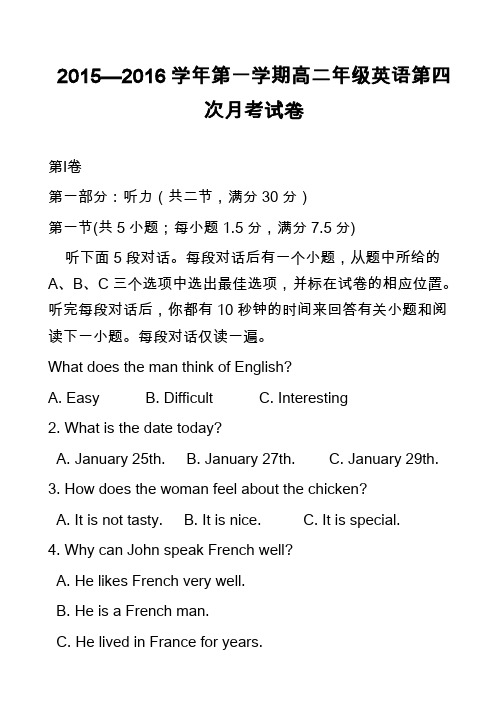
2015—2016学年第一学期高二年级英语第四次月考试卷第Ⅰ卷第一部分:听力(共二节,满分30分)第一节(共5小题;每小题1.5分,满分7.5分)听下面5段对话。
每段对话后有一个小题,从题中所给的A、B、C三个选项中选出最佳选项,并标在试卷的相应位置。
听完每段对话后,你都有10秒钟的时间来回答有关小题和阅读下一小题。
每段对话仅读一遍。
What does the man think of English?A. EasyB. DifficultC. Interesting2. What is the date today?A. January 25th.B. January 27th.C. January 29th.3. How does the woman feel about the chicken?A. It is not tasty.B. It is nice.C. It is special.4. Why can John speak French well?A. He likes French very well.B. He is a French man.C. He lived in France for years.5. What is the woman doing now?A. Working with a speech.B. Having lunch with a friend.C. Visiting the boss’s office.第二节(共l5小题;每小题1.5分,满分22.5分)听下面5段对话。
每段对话后有几个小题,从题中所给的A、B、C三个选项中选出学最佳选项,并标在试卷的相应位置。
听每段对话前,你将有时间阅读各个小题,每小题5秒钟;听完后,各小题给出5秒钟的作答时间。
每段对话读两遍。
听第6段材料,回答第6、7题。
6. What is wrong with the woman?A. She has a fever for a while.B. She feels a pain in the back.C. She has a pain in the chest.7. When should the woman get to the doctor’s?A. At 10:15.B. At 10:30.C. At 10:40.听第7段材料,回答第8-10题。
- 1、下载文档前请自行甄别文档内容的完整性,平台不提供额外的编辑、内容补充、找答案等附加服务。
- 2、"仅部分预览"的文档,不可在线预览部分如存在完整性等问题,可反馈申请退款(可完整预览的文档不适用该条件!)。
- 3、如文档侵犯您的权益,请联系客服反馈,我们会尽快为您处理(人工客服工作时间:9:00-18:30)。
右玉一中2016年5月月考试卷高二英语(时间:120分钟总分:150分)第一部分阅读理解(共两节;满分60分)(共15小题;每小题3分,满分45分)阅读下列短文,从每题所给的A、B、C、D四个选项中,选出最佳选项,并在答题纸上将该项涂黑。
AWe don’t know how different our future will be in the future. We can only try to imagine it.At first we think about human relationship. In the year 2050, we will use computers almost every day. We will be making new friends through the Internet----even our husbands or wives will be met in this way. It will be much faster and easier for us. On the other hand, our relationships with people won’t be as important as they are today----we will feel a little lonely.Computers will also help us in many other activities in 2050. For example, they will be used by the children at school to make their learning easier. In addition, there will be much more other machines which will play a similar role as computers, like robots which will do the housework for us.Spending holidays will also be completely different. Traveling to other planets or to the moon will be available for everyone. Means of transport will, of course, change, too. We will be using solar-powered cars, which will be much more environmentally friendly.We could expect that the faster technological progress would lead to a more pollution environment. But it isn't true. We will pay more attention to protecting the environment. And, scientists will probably find cures for many dangerous diseases, like cancer or AIDS. Therefore, our surroundings as well as our health will be in a better condition.Although we can’t predict the exact changes which will be made in the world, we often think about them. We worry about our and our children’s future; we have expectations, hopes as well as fears. But I think we should be rather sanguine about our future. We should be happy and believe good things will happen.1. Why will people probably feel a little lonely in 2050?A. Because the number of people will become much smaller.B. Because there will be less face-to-face communication.C. Because people won’t like making friends with each other.D. Because people won’t communicate with each other much often.2. According to the passage, which of the following will happen in 2050?A. The relationship between people will be more important than today.B. The way of spending holidays will be the same as that of today.C. It won’t be difficult for people to travel to other planets.D. Our environment will be much more polluted with a growing number of cars.3. What does the passage mainly talk about?A. How people will communicate in the year 2050B. What our life will be like in the year 2050C. How people will travel and spend their holiday in the year 2050D. What high technology will appear in the year 2050BSixth-grader Ivory Kelly finished up an English assignment at the blackboard. Then ... Ping! Ping! He felt something hitting his head. The 12-year-old knew just who was dissing him. He turned around and shouted at DeAngela Byrd. DeAngela claimed she was innocent. Then she called Ivory a “guinea pig.” “Hosemouth!” he shouted back. Their teacher, Linda Mann, didn’t send them to the principal. She didn’t even make them stand in the hall. Instead, she sent them to work things out in a small storage room. The room is Glengarry Elementary’s mediatio n center (调解中心).Mediation in school is a way to solve conflicts without having teachers punish students. Kids called mediators are trained to listen to classmates accused of misbehaving or fighting. Without taking sides, the mediators help troubled kids come up with their own solutions. It usually takes no more than 15 minutes.At Glengarry, 30 students from third through sixth grades are trained to settle fights. After calmly discussing the attack and name calling with sixth-grade mediators, Michael Reese and Tracie Thacker, Ivory and DeAngela signed a promise “not to mess with each other.”Many U.S. elementary schools are starting to give kids more responsibility for discipline. In the past 10 years, one-tenth of the nation’s 86,000 public schools have st arted programs to resolveconflicts, mostly in middle or high schools. But educators want to begin more mediation programs sooner. They say elementary-age kids are even better at talking about their feelings and deciding on a fair solution than older kids are! When a teacher or principal is not involved, “kids talk more freely,” says Glengarry Principal Loraine Johnson.So far, mediation seems to work well. In one survey of 115 Ohio elementary schools with mediation programs, two out of three noted a decrease in fights, and more than half said fewer kids were being sent to the principal’s office. In New Mexico, reports of bad behavior in elementary schools have dropped 85% since mediation programs began.4. The underlined word “dissing” in paragraph 1 is clo sest in meaning to ______.A. attemptingB. insultingC. laughing atD. helping5. Students trained in the mediation ______.A. are neutral, never taking sidesB. provide a solution for the troubled kidsC. accuse students of misbehaving or fightingD. decide on the punishment for misbehaving students6. Which of the following statements is false?A. Teachers are not mediators and won’t give judgments.B. Mediation programs in schools seem to reduce misbehavior.C. Elementary-age children are able to solve conflicts among schoolmates.D. Mediation programs encourage students to work with teachers to solve conflicts.7. What’s the best title for the passage?A. Don’t Mess with Each OtherB. A Drop in MisbehaviorC. Keep the Grownups Out of ItD. Stricter Discipline Promotes BehaviorCAt middle school level, there are many academic clubs in which the students can participate. Students can choose clubs that focus on an area of interest.Mathcounts ClubMathcounts tries to increase excitement about mathematic achievement. It hopes to provide students with the foundation for success in science, technology, engineering and mathematic careers. Schools select individuals and teams to participate in competitions. Mathcounts works tochallenge student math skills, develop self-confidence and give rewards for their achievements.EnvirothonThe Envirothon program focuses on natural resources knowledge and exposes students to diverse environmental issues, ecosystems, and topography (地形学). The ecology field competition for five-member middle school teams offers competitions in wildlife, soils, forestry, current environmental issues and aquatics (水上运动). Students work and learn in middle school clubs ·and can compete at local and state level.Future Problem SolversFuture Problem Solvers is an academic club that uses a six-step process to solve problems that may happen in the future. Students who like to “think outside the box” may like this club. Teams made up of four students read future scenes and write up solutions in a booklet using the six-step process. Teams that score high enough can go to the state competition and then to the international competition.Builders ClubBuilders Club is open to any middle school student who wishes to perform community service. The members learn by doing, and they learn organization, teamwork, and leadership. Builders Clubs can sponsor a “Teacher of the Year” program, provide a recycling collection point, organize canned food and clothing to support local shelters, adopt a resident at a local senior citizens home, adopt highway, tutor, etc.8. The students who are not interested in competition would probably choose _____.A. Mathcounts ClubB. Builders ClubC. Future Problem SolversD. Envirothon9. Why do some of the students choose Mathcounts club?A. To be successful in science careers.B. To enjoy solving future problems.C. To perform community service.D. To study wildlife and soils.10. What is the common feature of the four clubs?A. Competition.B. Sponsorship.C. Scientific research.D. Teamwork.11. The passage mainly talks about _____.A. the state academic competitionsB. middle school clubsC. extra-curricular activitiesD. the gifted studentsDLiu Huan is a professor at the University of International Business and Economics. He is also a noted musician and popular singer in the Chinese mainland.Born on Aug. 26, 1963 in to a teacher’s family in Tianjin, Liu enrolled at the University of International Relations in Beijing in 1981, majoring in French literature. He was retained at the university as a faculty member(教职工)after graduation in 1985. He won two first prizes in B eijing’s first-ever university English and French singing contests in 1985. To help promote local education by teaching music, he lived in Shizuishan, a remote area in the Ningxia Hui Autonomous Region, in 1985~1986. He was appointed a professor at the University of International Business and Economics to teach the history of Western music in 1991, and has been working at the university for more than 20 years.As a professor, Liu is invited every year to colleges and universities in Beijing to teach music courses. As a famous musician, when asked if his classes differ from other teachers’, Liu simply said, “Nothing different. While standing on the platform, I am just a teacher. Everything outside has nothing to do with me at that moment. ”Since becoming a professional singer in 1985, Liu’s singing has been widely welcomed across the country. He won many national awards, including the Top 10 Film and TV Singers in the Country in 1988, in 1990 and in 1992. On Aug. 8, 2008, Liu sang a duet “You and Me” with Sarah Brightman at the opening ceremony of the Beijing Olympic Games, reaching the top of his singing career. In addition to singing, Liu Huan also creates original scores for film and TV. His works have been well received by both audiences and his peers in the industry.Therefore, Liu is chosen to act as one of the four judges on “The V oice of China” , a surprisingly popular singing talent show which has been aired on Zhejiang Satellite TV since July 13, 2012. At the same time, his fellow judges are Na Ying, Yang Kun, and Harlem Yu. 12.What does the underlined word “noted” in the first paragraph mean?A. Famous.B. Skilled.C. Gifted.D. Important.13.Liu Huan used to live in Shizuishan, a remote area in the Ningxia Hui Autonomous Region to_____A. learn about their customs and culturesB. improve his ability of composing music by living in the villageC. help promote local education by teaching musicD. find some talented students in music14.When he reached the top of his singing career, he was .A. 45B. 22C. 28D. 4915.Which is NOT true of the description about his musical achievements?A. He has won the Top 10 Film and TV Singers in the Country three times.B. He succeeded in singing a duet “You and Me” with Sarah Brightman at the opening ceremony of the Beijing Olympic Games.C. He creates many original scores for film and TV.D. He is the only one who acts as a judge on “The Voice of China”.第二节(共5小题;每小题3分,满分15分)根据短文内容,从短文后的选项中选出能填入空白处的最佳选项。
